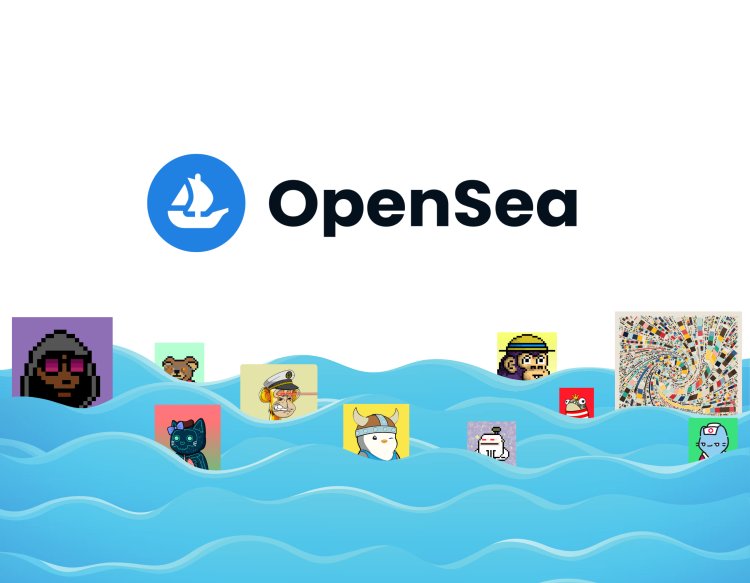OpenSea Raises $23 Million: About to be the Amazon of NFT's

When CryptoKitties appeared in 2017, most people took the collectible digital cat tied to the Ethereum cryptocurrency as a joke. But when Devin Finzer encountered an elegant cat that year, he had a different reaction. He realized that cryptocurrencies could be more than just finance. Finzer was not against finance. After all, just over a year ago, he sold Credit Karma, a money-hungry startup that is a financial performance checker.
CryptoKitties recalls Finzer, a Brown computer science graduate who programmed in tech industries including Google, Flipboard and Pinterest. But for him, the Pixel Cats opened up another opportunity. It was a business opportunity. "CryptoKitties was the first crypto application aimed at the average user, not traders or anyone really interested in speculative use cases," says Finzer.
The rising popularity of CryptoKitties gave Finzer the idea. “We could make Amazon or eBay for all these new intangible tokens,” he argued. NFTs, also known as NFTs, are a type of digital content recorded in digital databases that underlie virtual currencies such as Bitcoin and Ethereum. So Finzer joined Alex Atallah, a Stanford graduate who worked as a software engineer at Apple and Palantir, and enrolled in the Y Combinator Startup Accelerator Program and founded OpenSea.io, a blockchain-based commodity marketplace.
Swimming in the open sea.
Three years later (and a prolonged Bitcoin slump), the product of the Fastforward and CryptoKitties craze, the NFT is reborn. The creator's work, Beeple, generates $70 million, PopTarts' flying rainbow cat generates $600,000, and millions of dollars of digital content are exchanged with OpenSea every day.
The growth rate is amazing. Finzer said $95 million worth of digital goods were sold on the market in February alone, up from $8 million in January, Finzer said. As the site competes for market share with competitors such as Mintable, Nifty Gateway and Rarible, total revenue unexpectedly increased 100x from six months ago.
Traditional investors, as well as NFT collectors, are investing in OpenSea with great acknowledgment that the NFT economy is going nowhere. The startup has raised $23 million in a new venture funding round led by cryptocurrency-obsessed A16z Crypto from Silicon Valley venture capital firm Andreessen Horowitz. Other crypto-focused investors are also involved, including AngelList co-founder Naval Ravikant. Balaji Srinivasan, former CTO of Coinbase; Linda Xie of Scalar Capital; Andrew Steinwold of the Sfermion Foundation, which focuses on NFT; and Ryan Selkis of Messari Crypto Market Tracker. (Cryptoblog block recently reported that there is a trade going on.)
“We think there is a huge market. Look at Apple last year. People have bought $61 billion of digital content,” said Katherine Haun, partner Andreessen, who led the deal. Fortnite from Epic Games, one of the popular video games, made about $2.4 billion in 2018 from character cosmetics alone. Regarding the NFT craze, Haun says, "We don't think it's stupid or bizarre." She goes on to say that it will be temporary when the current craze subsides, thanking the work she bought from a Spanish artist. “We understand that there can be cycles. We are cryptocurrency investors, so we are very comfortable and very familiar with it. We've been doing this for a long time."
Swimming in uncharted waters.
OpenSea is also getting attention outside of the crypto industry. The startup is backed by a tech authority. Investors Reddit from Pinterest CEO Ben Silbermann From co-founder Alexis Ohanian, former Airbnb COO Belinda Johnson to SV Angel founder Ron Conway. Billionaire entrepreneur and Dallas Mavericks owner Mark Cuban and podcaster Tim Ferris, author of 4Hour Workweek, are also contributing to the round.
OpenSea teamed up with songwriter Shawn Mendes to sell their virtual avatars and created Gronk collectible cards with Tampa Bay Buccaneers football star Rob Gronkowski. The site sells everything from digital real estate in a virtual world called Decentraland to domain names for Ethereum wallets. (Dfinzer.eth refers to one of Finzer's personal wallets.)
“We wanted to attract many people who combine the world of cryptocurrency with the world of artists and creatives. Because you can actually see the NFT there. Pinzer says: Although the NFT was considered open to the mass market, even Finzer has been overwhelmed by dizzying activity in recent weeks. “We didn't expect things to happen so quickly and so widely,” he says. "NFT makes this space much more accessible," adds Finzer.







